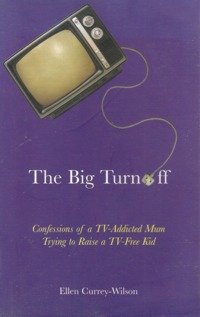Raising a child TV-free
A review of 'The Big Turnoff' by Ellen Currey-Wilson.

Year: 2007
Publisher: Algonquin Books of Chapel Hill
(Out of print, but a kindle ebook is available)
Having read so many books on the dangers and problems of TV for children (especially young children), I wasn’t expecting anything new. But “The Big Turnoff” isn’t about the dangers of TV, instead it is the very entertaining story of one mom’s struggles to raise her son TV-Free (or more accurately, TV-Free for the first few years, and low-TV thereafter).
And it is very much a struggle, her husband is skeptical, her friends and neighbors all love TV, and most of all, Ellen herself is seriously addicted to TV. Her plans to cut back from around 30 hours of TV per week to 2 hours per week before giving birth, don’t pan out. Instead she keeps watching. Even after Casey is born, she finds cutting back on her viewing extremely difficult. While nursing the baby, she built a barrier so he couldn’t see the TV. She watched TV while the baby slept and when her husband came home from work she would hand him the baby - and watch more TV. She couldn’t give up the TV, but she was adamant about not letting her son watch TV, she did not want him to end up like her.
And gradually she does manage to cut back on her own TV-watching. By joining a mom’s group, and getting back into writing for a local paper, she manages to replace TV characters with real-world adult human interaction, to the point where she doesn’t need the TV so much.
As she becomes more comfortable living with less TV, the next issue comes up. Except for close family members (and her therapist), no one knows about her plans to raise her son TV-free. It is her deep dark secret, how will the other moms in her circle react when they figure out her secret? Will they feel judged and uncomfortable around her? Will they kick her out of the group? This is one of her many worries.
Before TV took over childhood in America, raising a child TV-free was much, much easier. There was no choice in the matter and you didn’t have to worry about keeping your child entertained, you could just send him or her outside to play or over to a friend’s equally TV-free house. Now it is rare to see kids playing outside on their own, and now if your child goes over to a friend’s house, chances are very high that they’ll end up watching TV.
These are the dilemmas Ellen has to deal with. What should she do when the toddler’s birthday party’s main activity is watching a Disney movie after the birthday cake? How can she find a babysitter who doesn’t insist on having the TV on most of the time? How should she handle it when her husband comes home with a video for their son to watch? What should she do when the kindergarten teacher has Friday afternoon TV-time for the kids?
And finally she worries she may succeed too well, turning her son into a social pariah by not wanting to join the other kids in watching their favorite TV shows and movies.
Sadly, in some ways, Ellen is privileged to even be able to raise her child TV-free. For parents living in poverty, being able to find No-TV or Low-TV childcare is not always feasible. But for parents and caregivers (of whatever income) who want to reduce their own reliance on the electronic babysitter “The Big Turn-off” should be very inspirational.
But even in well-off neighborhoods, kids spending a lot of time in front of the TV, is the norm. Another norm in such neighborhoods, is parents signing their kids up for lots of extracurricular activities, and for a while now, experts have been urging parents to stop over-scheduling their kids. But Ellen makes a very good point that perhaps so many parents are signing their kids up for so many activities as a way to keep them from spending all their free time in front of the TV. Ellen writes:
“Kendra told me that the main reason she chooses to fill up Hannah’s schedule with so many activities is because it’s the only way they can keep her from watching television. “If she didn’t have a dance class and soccer, she would watch day and night.” Peggy’s kids are usually watching TV downstairs when I come over, but she’s quick to say, “They just got back from soccer and piano lessons.”” - page 262.
One review describes “The Big Turnoff” as “alternately hilarious and trenchant”. Quite often when books are described as hilarious, they really aren’t, but “The Big Turn-off” is a genuinely funny book, and Ellen and her family are genuinely likable and unique. It is rare to find an anti-TV book that is hard to put down, but with all the cross-currents of needing to watch TV and needing to fit in, against the wish for a more authentic, more grounded TV-free life, the result is much high drama, and a very fascinating book.
